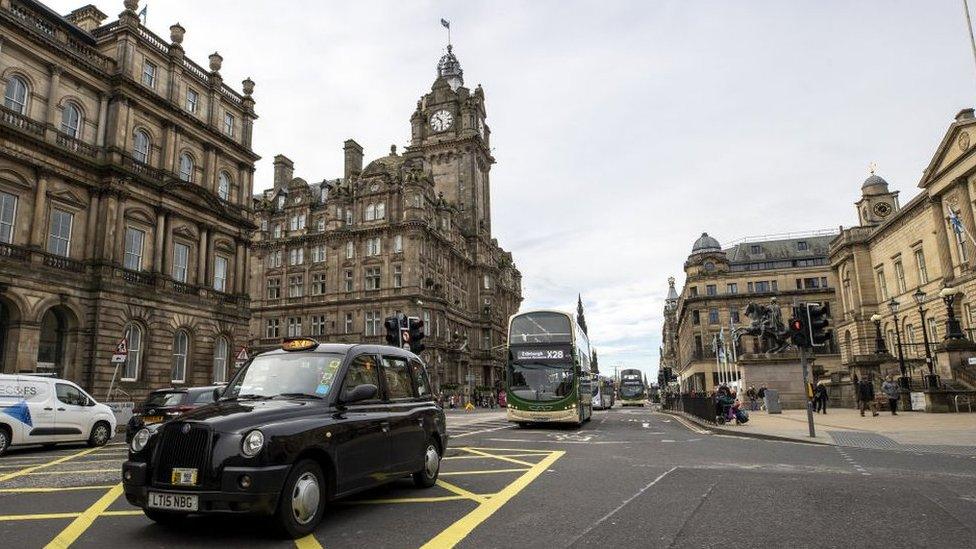Edinburgh short-term lets plan ruled unlawful
- Published

The policy is aimed at cutting the number of flats in the city that are used as short-term holiday lets
A plan to regulate Airbnb-style lets in Edinburgh has been ruled unlawful by a judge less than four months before it was due to come into force.
Operators and landlords opposed to the scheme took the city council to court last month.
After a two-day hearing at the Court of Session, Lord Braid agreed that part of the proposal was unlawful.
The decision was hailed as a "victory for law and common sense" by the group that brought the case.
The council wants to introduce the licensing scheme in response to concerns about the high number of short-term lets in the capital - particularly in the city centre.
It argues that the lettings have exacerbated housing shortages and fuelled anti-social behaviour.
Hosts have until 1 October to apply for a licence, with people who list whole properties on sites such as Airbnb also needing to apply for planning permission.
Renting out a room in your own home, or letting your home while on holiday, would still be allowed.
Opponents of the scheme raised £300,000 through crowdfunding for a judicial review at the Court of Session, which was said to be largest amount raised for a case in the UK.
The case centred on a presumption against allowing entire flats within tenement blocks to be used as holiday lets unless their owners could demonstrate why they should be exempt.
Lord Braid ruled that the presumption was unlawful and that the lack of provision for temporary licences and requirement for some hosts to supply floor coverings went beyond the council's powers.
He said the policy was unlawful because it breached existing laws on what licensing authorities could do under the law.
The judge wrote: "It is not the function of the respondent's licensing authority to decide that a licence should not be granted because a property is of a particular type or is in a particular area.
"For the respondent to adopt a normal practice of not granting an short term licence for premises in a tenement, even where planning permission had been granted, is irrational and contrary to the purposes of the overall statutory scheme.
"It would be perverse and oppressive for the respondent, upon receipt of a licensing application, to require an applicant to obtain planning permission for a tenement property; and thereafter, planning permission having been obtained, to refuse the licence for no other reason than that the property was in a tenement."
The Scottish government says that in certain areas - particularly tourist hot spots - high numbers of lets can cause problems for neighbours and make it harder for people to find homes to live in.

Supporters of the licensing scheme say short-term lets are causing a housing shortage and increasing anti-social behaviour in the capital
Council leader Cammy Day said he made "absolutely no apology for seeking to protect our residents" despite the ruling.
He added: "It is no secret that we face unique housing pressures here in Edinburgh, with a small but densely populated city centre and fast growing population, and it's crucial for us to strike the right balance between promoting our visitor economy while looking after the people that live here all year round.
"Our residents have told us that, in many cases, short-term lets are hollowing out their communities, reducing housing supply and increasing housing costs.
"We can't forget that many have endured years of disturbance and anti-social behaviour and we will continue to work hard to get this right."
Mr Day said the court had "acknowledged our intention to find a solution to this and agreed that it was legitimate to use both planning and licensing policy", with the council now considering its next steps.
A statement issued by the petitioners in response to the judgement said they hoped it would lead the council and government to "seek a fresh approach that aims to collaborate and work with local operators of self-catering accommodation, recognising the many good things it brings to the economy and people of Scotland".
It added: "As the largest crowdfunded case in the history of the UK, the petitioner team are deeply grateful to the many small, local businesses that supported the campaign financially in such uncertain times.
"That grass roots support made it possible for us to take this action, challenging both licensing and planning surrounding short-term lets in Edinburgh and the potential wider impact across urban and rural Scotland."
Housing crisis
Fiona Campbell, chief executive of the Association of Scotland's Self-Caterers, welcomed the ruling, which she said would also have ramifications for other licensing schemes across Scotland.
She said: "The Scottish government need to go back to the drawing board on short-term let regulation and engage constructively with industry to provide a regulatory framework that works for all stakeholders."
The proposals were approved by the council's planning committee last year after 88% of the 5,600 people who responded to a consultation on the proposals supported the introduction of the licensing scheme.
Eilidh Keay from tenants' union Living Rent Edinburgh said the decision "demonstrates how a small group of people can use their money and power to weaponise the legal system to their advantage".
She said: "This flies completely in the face of democracy and the will of the people.
"Edinburgh needs homes, not holiday lets. In coming down in support of short-term let operators, this decision seems to have forgotten that Edinburgh is in the midst of a housing crisis.
"It is disgusting that the profit of short-term let operators should be put before the needs of tenants, residents and communities for homes."
Additional reporting by Donald Turvill, Local Democracy Reporting Service